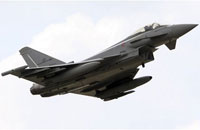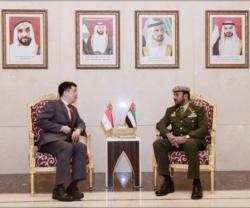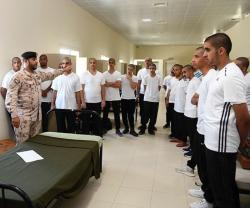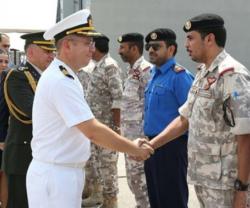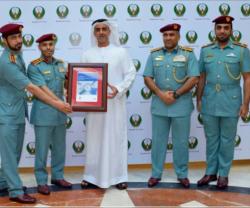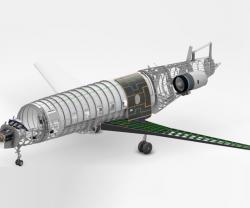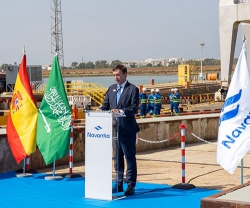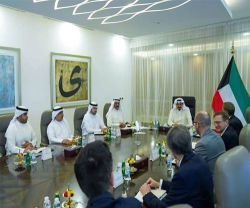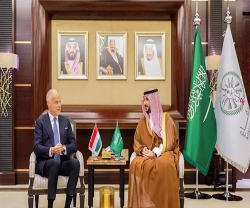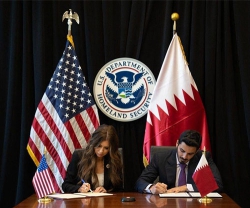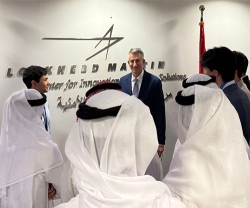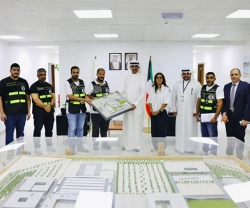Al Arabiya was granted exclusive access to a private meeting of more than 50 British CEOs and Executives from leading companies, including defence contracting giant BAE Systems, where the UK’s Minister of State for Trade and Investment, Lord Stephen Green, made the case for the Typhoon combat aircraft Britain is hoping to sell to the Emirates.
“In the form of Typhoon we have a great plane to offer the UAE. We believe it meets the real long term defence and security needs of UAE,” Lord Green told Al Arabiya in an interview, adding that the deal would provide “significant technological and industrial benefits to the UAE, the UK and the European defence industry.”
This high level meeting in London comes shortly before a delegation of British security service companies heads to the Gulf to drum business and after a series of conferences and trade missions focused squarely on opportunities for Britain in the Middle East and Arabian Gulf region as part of the current administration’s so-called “Commercial Diplomacy” strategy.
Speaking exclusively to Al Arabiya, the UAE Ambassador Abdurahman Ghanem al-Mutaiwee said, “the UAE can benefit from Britain’s expertise both in the military and civilian fields” but added that “benefits must be for both sides, be it the UK or the UAE. If benefits are one sided, the partnership won’t continue.”
The vast majority of British exported goods in general, and to the Middle East in particular, are defence and military equipment.
The Typhoon fighter jet was used by NATO forces in the campaign in Libya last year and is manufactured by the European arms consortium Eurofighter which includes the UK’s BAE Systems, Italy’s Finmeccanica and EADS.
The UAE invited Typhoon’s manufactures late last year to submit a proposal for supplying the Typhoon jets. This overture by the UAE was considered a coup for the British-led arms consortium given that the UAE had been in talks with France’s Dassault since 2008 over the purchase of up to 60 French-built Rafale fighters in a deal reportedly worth $10 billion. This comes as the UAE seeks to replace its fleet of Mirage 2000s bought in 1983.
Contracts in the defence industry are long term and mega-deals like this potential Typhoon contract usually come round once every decade or even longer, which is why Britain is keen to secure this one.
But as a UK trade official explained, the partnerships created from such deals are equally important to longer term trade relations and often spill over into other sectors. “We want all investments to be joint ventures or partnerships” he said referring to Abu-Dhabi’s Mubadala as a key strategic partner.
Gulf Officers and personnel already receive training at Britain’s many military academies and the UK wants to expand this knowledge transfer by providing its Gulf partners with the expertise needed to manufacture the military equipment themselves - hence the partnerships sought with Mubadala’s Defence and Aerospace arm. Such partnerships also mean Gulf Engineers and Army Officers would gain the needed skills to maintain sophisticated weapons like the Typhoon, thus enhancing regional skills and creating jobs locally.
According to Alan Garwood, Head of Business Development at BAE Systems which has been active in the UAE for 30 years, the company has been providing pilot training to UAE Air Force Officers for 15 years and established one of the first aircraft leasing companies in Abu Dhabi. It is this kind of longevity that Britain is hoping will win it the Typhoon contract, reportedly worth more than £3bn ($4.75 billion).
The UK is the world’s second largest exporter of defence products and services after the United States, with a fast growing defence industry that saw its global market share increase to 22% in 2010. Aviation is a key part of that, accounting for 80% of Britain’s total defence exports.
Given that the Middle East is the UK’s most important market for defence products and services it comes as no surprise that British businessmen and ministers are on a full-blown charm offensive in the region. Saudi Arabia alone was the biggest defence importer in the word over the past ten years, according to UK government figures, while the UAE ranks 9th globally.
BAE Systems and its European consortium partners are expected to put forward the formal proposal to the UAE within weeks according to a UK trade official, after which the UAE will evaluate the costs and benefits of the offer. The official said it is unlikely decision by the UAE will be taken this year.
In addition to the UAE proposal, the Eurofighter consortium is eyeing further deals in the region, including possible deals in Qatar and a sale of up to 12 Typhoons to Oman’s Air Force reportedly worth more than £2billion ($3.17 billion) in a deal that could be completed later this year following an Omani “request for proposals” in January.
Source: By Carina Kamel; Al Arabiya; London

